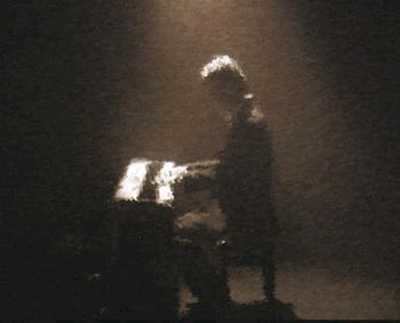Paravicini’s Accidental Virtuosity
Our third guest blogger is Jake Evans from the bluegrass/country swing band called The Stillhouse Orchestra. Many thanks, ed Jake! – Nadya

Virtuosity is one of those terms so overused as to have lost much of its meaning. The word is all too often misapplied to mere technical prowess, impressive though that may be. Derek Paravicini is a pianist for whom the word could have been coined, playing with a firecracker passion that speaks to something primal in the human spirit, right in the heart of where music itself originates. When Paravicini plays, the listener gains a sense of a person driven by the core of his nature; born to it, as it were.
Paravicini was born on 26th July 1979, fifteen weeks premature and weighing less than half a kilo. His twin sister died at birth. As a result of the relative crudity of medical knowledge at the time, the oxygen levels in Derek’s incubator were too high, which left him blind and with severe autism. Derek Paravicini cannot tell left from right, yet he can play Rimsky-Korsakov’s Flight of the Bumblebee note perfect from memory. In fact he remembers every one of the thousands of pieces he has heard in his lifetime, but struggles to count to ten.
Part 1 of the occasionally excellent Five TV Extraordinary People episode about Derek after the jump.
[kml_flashembed movie=”http://www.youtube.com/v/1kwjDLHX92w” width=”400″ height=”330″ wmode=”transparent” /]
There is some debate as to whether Paravicini’s unique ability as a pianist can actually be considered ‘talent’ per se, with some feeling that his savantism should leave him unable to truly interpret and express the emotional depths of the music he plays. This point of debate leads to one of the more dubious sequences of the Five TV film, in which an ‘expert in music and emotion’ attempts to test his ability to both respond to and imbue emotion in music.
For my money the question is solved quite simply by listening to Paravicini perform. From the first notes it is impossible to doubt that this is an absolute master of his art, blending light and shade to produce a gloriously mature and rounded performance. Paravicini may not have the greatest personal understanding of the emotions he portrays, but if he doesn’t it seems no obstacle to his ability to portray them. If what Derek Paravicini has isn’t talent, then there are a great many ‘talented’ metal guitarists who need their currency reevaluating.

Much more interesting than ultimately meaningless pontificating about whether or not certain types of ability can be considered talent is what savantism implies about the nature of human personality, emotion and other such ethereal but essential concepts. Derek Paravicini is quite clearly put together very differently from the majority of people. One might draw a rather crude picture of the inside of his head in which the space normally occupied by social consciousness, emotional intelligence and the ability to perform basic tasks such as dressing and feeding himself was instead taken up by his phenomenally overgrown musical ability.
The relationship between the circumstances of Paravicini’s early months and his subsequent mental development illustrates one of the more difficult aspects of savantism and other brain conditions, particularly for those who are not the direct sufferers. Human beings set a great deal of store by our personalities. The individuality of our minds and abilities and the way in which we engage with the world is something which the most atheistic of us cling to as an almost mystical quality, something which elevates us beyond the realms of cold, base rationality. It can be upsettingly prosaic for us to imagine that our minds, our rich and complex personalities and even such giddy heights of human endeavour and sophistication as musical virtuosity can apparently be reduced to a series of switches or triggers. To think that something as a few extra milligrams of oxygen pumped into a hospital incubator can have such a profound effect as to produce a wondrous human oddity such as Derek Paravicini is awe inspiring in its banality.
Watch the documentary, listen to the recordings, draw your own conclusions. For what it’s worth, in my opinion Derek Paravicini has a better claim to the title of virtuoso than any musician I have heard in a very long time.

March 31st, 2008 at 3:34 pm
Oh this was lovely, thank you.
I don’t think talent like that should be analyzed by scientists, just appreciated for what it is.
EDIT: Not to sound as if I hate science or anything. I just think sometimes humans overthink things.
March 31st, 2008 at 7:42 pm
As a psychologist to me it’s the very randomness and banality of human function that makes our existence so incredible. When it comes down to it, ALL of human function is extraordinary on some level, from virtuoso level artistic expression to an eyeblink, it’s all utterly astounding once you realize how complex our brains are and how utterly and incomprehensibly unlikely it is for us to be doing anything at all, much less reproducing music at a masterpiece level from one exposure.
Seeing Derek sit down and play the lullaby, it reminded me how incredible we all are in a way I haven’t thought of in years.
Thank you.
April 1st, 2008 at 12:30 am
“…There is some debate as to whether Paravicini’s unique ability as a pianist can actually be considered ‘talent’ per se, with some feeling that his savantism should leave him unable to truly interpret and express the emotional depths of the music he plays…”
Given how some analyze music to levels beyond those who actually play and compose it I’m surprised this is an issue. Music hits us all so differently that how its played has little importance if it does not truly strike a cord.
I couldn’t agree more with the question being solved by listening to the man play…it isn’t just technical awareness and skill…it has actual heart and warmth to it that wherever it comes from can’t be denied.
April 1st, 2008 at 12:37 am
I did some more research on him and found out that he’s the great-great grandson of William Somerset Maugham! How interesting. And yeah, you’re right – the quality of the YouTube commentary is above average.
I wonder how Derek would respond to and interpret more “weird music” – like ethereal, techno, etc. His mind interprets music on a more complex level than normal people and I’d love to know what he makes of a band like, say, Aphex Twin. I hope that maybe one day Derek writes his own music. They showed him improvising some jazz – maybe that’s a first step in the direction of original material? But even if he performs just other classics for the rest of his life, he’s still an amazing and inspired performer.
Also wanted to point out that he has a very interesting face – would love to draw him.
April 1st, 2008 at 1:14 pm
If we lend artistic credibility to musicians who were indoctrinated by force in early childhood, then it’s no struggle in my mind to honour Derek’s lifetime of work.
He doesn’t mime, the way way many savants seemingly do, interprets liberally when he is given the chance, and makes a piece his own in a way that a ‘machine’ could never do. He gravitated toward music in the natural way that humans so inclined ought to do.
With so many mediocre musicians accepted at professional level for their technical ability, there is clearly a case to be made in appreciating this man in his honest, and remarkable, musicianship.
Thanks for sharing his astonishing story, Jake.
April 1st, 2008 at 1:15 pm
….although Yngwie owns ¬_¬